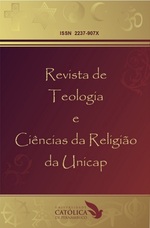“TODAS AS MINHAS FONTES ESTÃO EM VÓS” (SL 87,7)
O SALTÉRIO E A ORAÇÃO PELA UNIDADE
DOI:
https://doi.org/10.25247/paralellus.2022.v13n33.p357-370Palavras-chave:
Ecumenismo, Universalismo, Oração, Unidade dos povosResumo
A dimensão "ecumênica" do Saltério pode ser compreendida, em particular, se considerarmos como a questão do universalismo é abordada neste trabalho. A presente contribuição esboça uma análise da forma como a relação entre a oração e, de fato, o universalismo, é declinada nos salmos - primeiro levando em consideração alguns textos individuais e depois o livro como um todo. As diferentes formas nas quais a jornada em direção à unidade dos povos é representada, cada uma associada a uma forma diferente de oração, constituem uma das premissas da visão do Novo Testamento da Igreja, na qual se baseiam os esforços do ecumenismo contemporâneo.
Downloads
Referências
BARBIERO, G., «L'eucarestia degli ‘anawim: Sal 22,23-32», Initium sapientiae. FS F. Festorazzi (R. FABRIS ed.) (SrivBib 36; Bologna 2000) 113-127.
BARBIERO, G., «The Risks of a Fragmented Reading of the Psalms: Psalm 72 as a Case in Point», ZAW 119 (2007) 67-91.
BARBIERO, G., «“Dio Sion si dirà: ognuno è stato generato in essa”. Studio esemplare del Sal 87», Biblical Exegesis in Progress. Old and New Testament Essays. 100th Anniversary of the Foundation of the Pontifical Biblical Institute (J.-N. ALETTI – J.-L. SKA edd.) (AnBib 176; Roma 2009) 209-264.
BERLIN, A., Biblical Poetry Through Medieval Jewish Eyes (Indiana Studies in Biblical Literature; Bloomington-Indianapolis 1991).
COLE, R.L., Psalms 1-2. Gateway to the Psalter (HBM 7; Sheffield 2013).
CRAIGIE, P.C., Psalms 1-50 (WBC 19; Waco, TX 1983).
EBACH, R., «Universalismus/Partikularismus (AT)», WiBiLex (2020) [https://www.bibelwissenschaft.de/wibilex/das-bibellexikon/lexikon/sachwort/anzeigen/details/universalismus-partikularismus-at/ch/38652509cc2fee7cc446aec82de8a685/].
HAARMAN, V, JHWH-Verehrer der Völker. Die Hinwendung von Nichtisraeliten zum Gott Israels in alttestamentlichen Überlieferungen (AThANT 91; Zürich 2008).
HOLLADAY, W.L., The Psalms Through Three Thousand Years. Prayerbook of a Cloud of Witnesses (Minneapolis 1996).
HOSSFELD, F.-L., «Der elohistische Psalter Ps 42-83. Entstehung und Programm», The Composition of the Book of Psalms (E. ZENGER ed.) (BEThL 238; Leuven 2010) 199-213.
HOSSFELD, F.-L. – ZENGER, E., Die Psalmen. I: Psalm 1-50 (Würzburg 1993).
HOWARD, D.M., The Structure of Psalms 93-100 (Biblical and Judaic Studies 5; Winona Lake, IN 1997).
KANG, SU WON, L'atteggiamento del Salterio greco verso i popoli pagani. Studio comparativo tra il TM e la LXX sul tema dell'universalismo (SrivBib 65; Bologna 2018).
KÖRTING, C., Zion in den Psalmen (FAT 48; Tübingen 2006).
KÖRTING, C., Israel und die Völker. Ein Beitrag zur Theologie der Hebräischen Bibel und zur Biblischen Theologie (Beyond Biblical Theologies 295; Tübingen 2012).
LEUENBERGER, M., Konzeptionen des Königtum Gottes im Psalter. Zu Komposition und Redaktion der theokratischer Bücher IV-V im Psalter (AThANT 83; Zürich 2004).
MACHOLZ, C., «Psalm 100 – Israels Todah-Feier mit den Volkern», Prophetie und Psalmen. FS K. Seybold (B. HUWILER et al. edd.) (Münster 2001) 143-152.
VAN OORSCHOT, J., «Der ferne deus praesens des Tempels. Die Korachpsalmen und der Wandel israelitischer Tempeltheologie», «Wer is wie Du, Herr, unter den Göttern?». FS O. Kaiser (I. KOTTSIEPER et al. edd.) (Göttingen 1994) 416-430.
PATTERSON, R.D., «A Multiplex Approach to Psalm 45», GTJ 6 (1985) 29-48.
PAVAN, M., «He Remembered that They Were but Flesh, a Breath that Passes and Does Not Return» (Ps 78,39). The Theme of Memory and Forgetting in the Third Book of the Psalter (ÖBS 44; Frankfurt a.M. 2014).
PAVAN, M., «The Psalter as a Book? A Critical Evaluation of the Recent Research on the Psalter», The Formation of the Hebrew Psalter. The Book of Psalms between Ancient Versions, Material Transmission and Canonical Exegesis (G. BARBIERO – M. PAVAN – J. SCHNOCKS edd.) (FAT I 151; Tübingen 2021) 13-84.
PAVAN, M., «“Le spezzerai con scettro di ferro” (Sal 2,9a). Preghiera e politica nel libro dei Salmi» [in uscita].
PETRANY, C., Pedagogy, Prayer and Praise: The Wisdom of the Psalms and Psalter (FAT II 83; Tübingen 2015).
SCAIOLA, D., «La conclusione (Sal 146-150) e lo scopo del Salterio», RivBib 63 (2010) 279-297.
STANSELL, G., «The Nations' Journey to Zion. Pilgrimage and Tribute as Metaphor in the Book of Isaiah», The Desert Will Bloom. Poetic Visions in Isaiah (A.J. EVERSON – H.C.P. KIM edd.) (SBL.AIL 4; Atlanta 2009) 233-255.
STRAWN, B., «(Proto-)Masoretic Texts and Ancient Texts Close to MT», Textual History of the Hebrew Bible (A. LANGE – E. TOV edd.) (Leiden-Boston 2017) 42-60.
TROTTER, J.M., «The Genre and Settinf of Psalm 45», ABR 57 (2009) 34-46.
WAGNER, A., «Strukturen des Gebets im Alten Testament», Orakel und Gebete. Interdisziplinäre Studien zur Sprache der Religion in Ägypten, Vorderasien und Griechenland in hellenistischer Zeit (M. WITTE – J.F. DIEHL edd.) (FAT II. 38; Tübingen 2009) 197-215.
WALLACE, R.E., The Narrative Effect of Book IV of the Hebrew Psalter (Studies in Biblical Literature 112; New York 2007).
WALTKE, B. – HOUSTON, J.M., The Psalms as Christian Worship. A Historical Commentary (Grand Rapids, MI-Michigan 2010).
WESTERMANN, C., Lob und Klage in den Psalmen (Göttingen 1977).
WILLGREN, D., The Formation of the «Book» of Psalms. Reconsidering the Transmission and Canonization of Psalmody in Light of Material Culture and the Poetics of Anthologies (FAT 88; Tübingen 2016).
WILSON, G.H., The Editing of the Hebrew Psalter (SBL.DS 76; Chico, GA 1985).
ZENGER, E., Ein Gott der Rache? Feindpsalmen verstehen (Biblischer Bücher 1; Freiburg-Basel-Wien 1994).
ZENGER, E., «Zur redaktionsgeschichtliche Bedeutung der Korachpsalmen», Neue Wege der Psalmenforschung (K. SEYBOLD – E. ZENGER edd.) (HBS 1; Freiburg-Basel-Wien 1994) 175-198.
ZENGER, E., «Theophanien des Königsgottes JHWH: Transformationen von Psalm 29 in den Teilkompositionen Ps 28-30 und Ps 93-100», The Book of Psalms. Composition and Reception (P.W. FLINT – P.D. MILLER edd.) (VT.S 99; Leiden-Boston 2005) 407-442.
ZENGER, E., LOHFINK, N., Der Gott Israels und die Völker. Untersuchungen zum Jesajabuch und zu den Psalmen (SBS 154; Stuttgart 1994).
Downloads
Publicado
Edição
Seção
Licença
Copyright (c) 2022 Marco Pavan

Este trabalho está licenciado sob uma licença Creative Commons Attribution 4.0 International License.
A submissão de originais para a Paralellus implica a transferência, pelos autores, dos direitos de publicação eletrônica. Os direitos autorais para os artigos veiculados neste periódico são do autor; todavia, são da revista os direitos sobre a primeira publicação. Os autores somente poderão fazer uso dos mesmos resultados em outras publicações se indicarem, claramente, que a Paralellus foi o meio originalmente utilizado. Em decorrência do fato de ser a Paralellus uma revista de acesso público, é permitida a utilização gratuita dos artigos em aplicações educacionais e/ou científicas não comerciais, desde que respeitando-se a exigência de citação da fonte (Texto atualizado em 16-11-2020).



















